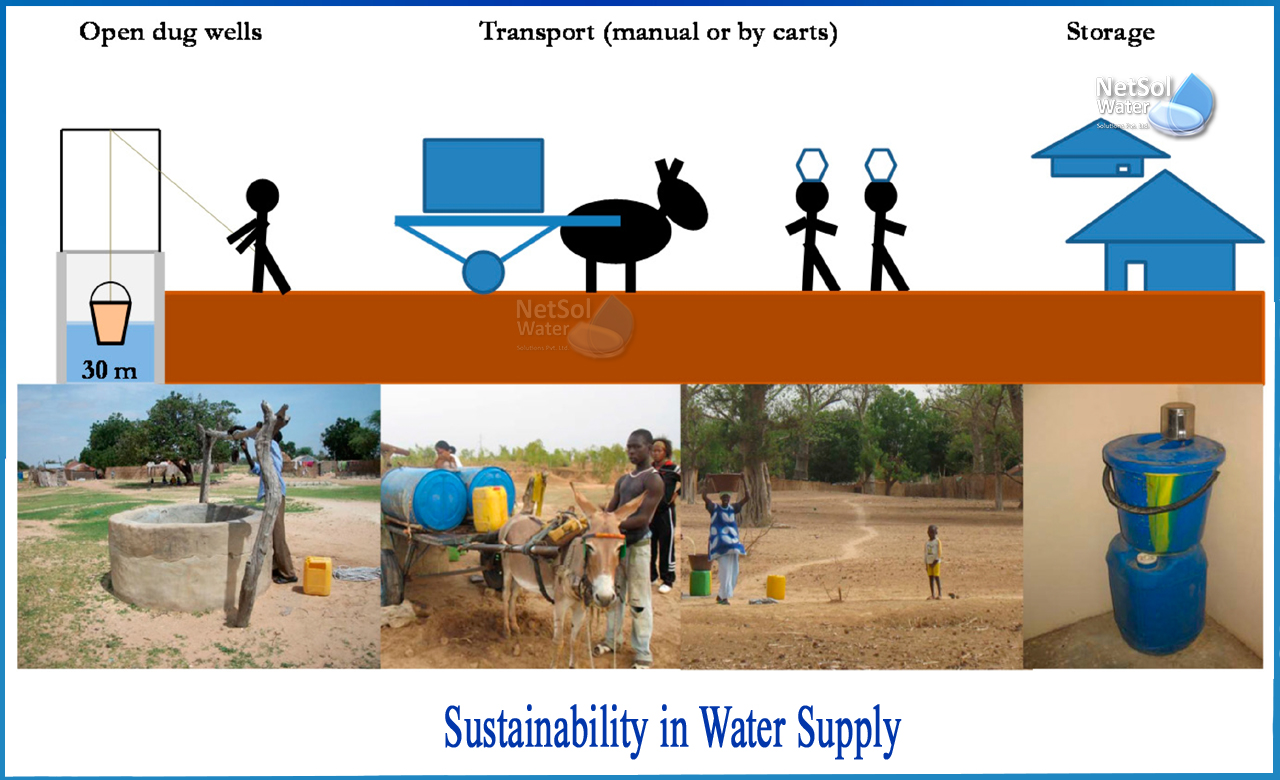Overview
The scope remains global and macroscopic, while regional variances may exist based on the water sources available in a given location. What is deemed "sustainable" in one region may be a threat to sustainability in another.
Why is water sustainability important in Water Supply?
Sustainable water systems should supply enough water quantity and suitable water quality for a particular requirement without jeopardizing the capacity and quality's future availability. Water systems in the context of sustainable development may not physically contain the use of water, but they do include systems where the use of water has historically been essential. Waterless toilets and vehicle washes are two examples, and their use helps to ease water stress and provide a sustainable water supply.
The objective of water usage is connected to accessing the sustainability aspects in water supply, that is, the three-fold goals of economic feasibility, social responsibility, and environmental integrity. When resources are scarce, these goals may conflict; for example, water needed to fulfil the demands of a growing urban population and those of rural agriculture.
Water is utilized in various ways-
i. to survive as it is essential for drinking,
ii. in industrial processes (energy production, manufacturing of goods, etc.),
iii. household uses (cooking, cleaning, bathing, sanitation), and
iv. Agriculture.
The Fundamental Water Sources
1: Water on the surface
Unfortunately, the world's surface freshwater supply is limited and unevenly distributed.
Dams, for example, can be used to impound water for consumption. Dams can be used for a variety of purposes, including power generating, water supply, irrigation, flood protection, water diversion, navigation, and so on. Dams, when correctly designed and built, may assist provide a sustainable water supply.
Large-scale dam projects may pose a number of problems to sustainability, including negative environmental consequences on wildlife habitats, fish migration, water flow and quality, and economical implications from displaced local residents. To establish the environmental, economic, and social effects of the building, a sustainability impact assessment should be done.
2: Groundwater
Groundwater provides for more than half of all freshwater on the planet, making it vital for drinking water. If the entire quantity of water entering, leaving, and being stored in the system is saved, groundwater can be a sustainable water supply source.
Precipitation, the location of streams and other surface-water bodies, and evapotranspiration rate are the three main factors that determine the source and amount of water flowing through a groundwater system; thus, a sustainable withdrawal or pumping rate for groundwater cannot be generalized.
Unsustainable groundwater usage causes water-level reduction, reduced streamflow, and poor water quality, putting affected populations' livelihoods at risk. When extracting groundwater, a long-term perspective is required since the repercussions of its development might take years to become evident. Groundwater supply must be integrated into adequate land planning and sustainable urban drainage systems.
3: Rainwater Harvesting
Water collected from precipitation is one of the most sustainable sources of water supply since it includes intrinsic obstacles to over-exploitation present in surface and groundwater sources, and it immediately delivers drinking water quality. Rainwater harvesting systems, on the other hand, must be properly constructed and maintained in order to collect water effectively, prevent contamination, and utilize sustainable treatment technologies if the water is contaminated.
There are several point-of-use drinking water treatments available, each having their pros and cons. Solar treatment, boiling, filtering, chlorination, combination treatments such as filtration and chlorination and flocculation are examples of these.Although rainwater collecting may hypothetically fulfil world water demand given the Earth's surface and precipitation, the solution is most practicable as a complement to sustainable water delivery systems given the amount of uncertainty (particularly with climate change) and competing land-use purposes.
4: Recycled Water
Reclaimed water, or water that has been reclaimed from human usage, may also be a reliable source of water. It is a critical option for reducing stress on basic water resources including surface and groundwater. Greywater recycling systems and the usage of microporous membranes are examples of both centralized and decentralized systems.
To offer the right quality for a specific application, reclaimed water must be processed (irrigation, industry use, etc.).It is frequently more efficient to separate greywater from blackwater, allowing the two water streams to be used for distinct purposes. Greywater is generated by household activities such as washing, whereas blackwater contains human waste. As a result, the two waste streams have different properties.
Conclusion
Only through promoting efficiency on both the supply and demand sides can a water delivery system be considered sustainable. Initiatives to fulfil water supply demand will be more sustainable if they emphasize initiatives to reduce water waste. Avoiding waste will help to reduce water usage and, as a result, postpone the demand for additional resources.
Netsol provides various technologies which will preserve water in order to attain water sustainability. This is our basic goal and that is why, we provide complete solutions for water and wastewater management.
Netsol Water is Greater Noida-based leading water & wastewater treatment plant manufacturer. We are industry's most demanding company based on client review and work quality. We are known as best commercial RO plant manufacturers, industrial RO plant manufacturer, sewage treatment plant manufacturer, Water Softener Plant Manufacturers and effluent treatment plant manufacturers. Apart from this 24x7 customer support is our USP. Call on +91-9650608473, or write us at enquiry@netsolwater.com for any support, inquiry or product-purchase related query.



